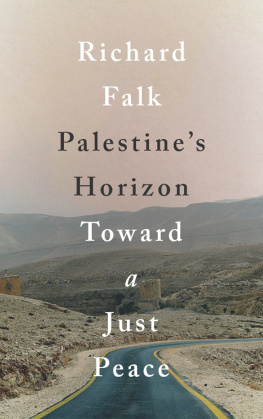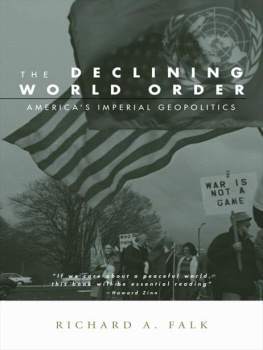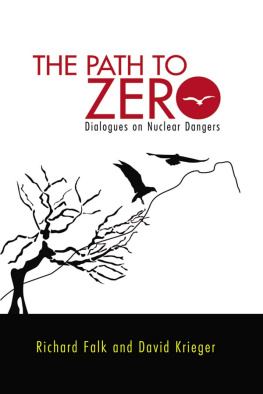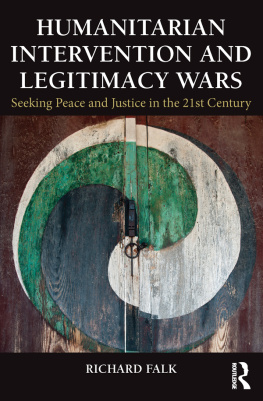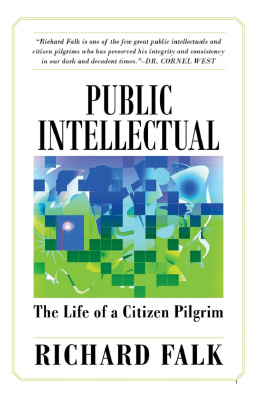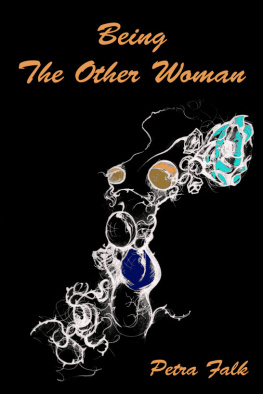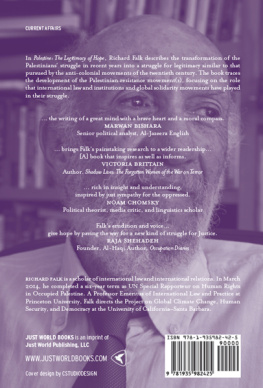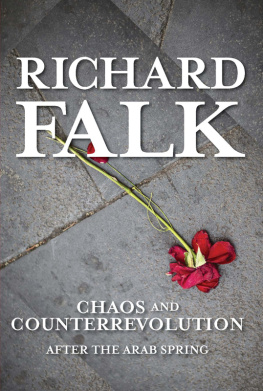Palestines Horizon
Palestines Horizon
Toward a Just Peace
Richard Falk
First published 2017 by Pluto Press
345 Archway Road, London N6 5AA
www.plutobooks.com
Copyright Richard Falk 2017
The right of Richard Falk to be identified as the author of this work has been asserted by him in accordance with the Copyright, Designs and Patents Act 1988.
British Library Cataloguing in Publication Data
A catalogue record for this book is available from the British Library
ISBN 978 0 7453 9975 1 Hardback
ISBN 978 0 7453 9974 4 Paperback
ISBN 978 1 7868 0075 6 PDF eBook
ISBN 978 1 7868 0077 0 Kindle eBook
ISBN 978 1 7868 0076 3 EPUB eBook
This book is printed on paper suitable for recycling and made from fully managed and sustained forest sources. Logging, pulping and manufacturing processes are expected to conform to the environmental standards of the country of origin.
Typeset by Stanford DTP Services, Northampton, England
Simultaneously printed in the United Kingdom and United States of America
May Dawn Finally Arrive for the People of Palestine
Contents
Acknowledgements
No political issue during the last decade has been as preoccupying and discouraging for me as the failure to find a sustainable and just peace for the Palestinian people. This book attempts to depict recent phases of this Palestinian struggle and its aspirations. It is also animated by the belief that history cannot be undone, and that a decent future depends on Palestinians and Israelis finding creative ways to live together that are beneficial for both peoples.
In preparing this book, I was greatly influenced by my six years (20082014) serving as the UN Special Rapporteur for the Palestinian Territories Occupied since 1967 under the auspices of the Human Rights Council. In that role, I was greatly assisted by several talented and energetic members of the staff of the Office of the High Commissioner for Human Rights in Geneva: Linnea Arvidsson, Kiyohiko Hasegawa, and Kevin Turner were particularly helpful in countless ways, including substantively.
Among Palestinians, I have benefited always from the insight, experience, and friendship of Raji Sourani and Mohammed Omer, who are brave and doing invaluable work under the most difficult of conditions. In the United States, I would mention Ali Abunimah, who has long contributed humane and engaged commentary on the Palestinian struggle, as well as being the founder and main coordinator of the online Electronic Intifada that offers one of the best sources of information about the ongoing developments arising from the daily friction of Israel/Palestine interaction.
There are many others who deserve mention, but to avoid a long list, I will mention only Jeff Halper and Phyllis Bennis, who are both dedicated to a just outcome of the long conflict that is responsive to Palestinian grievances and rights, while being mindful of Israels security and survival.
Vicky Mason agreed to allow the inclusion here of our collaborative article on Palestinian nonviolence, and deserves the lions share of the credit for the shaping and presentation of this generally overlooked dimension of Palestinian resistance. I also want to thank Norma Hashim for involving me in her important efforts to make available to the world the voices of Palestinian prisoners, including children, which are not only moving but also confirm impressions of the cruelty of Israel practices associated with its occupation regime.
It was my pleasure to work with Pluto Press from start to finish on this book. David Shulman was not only encouraging all along, but also made detailed and fundamental suggestions that led me to do considerable additional work on the manuscript for which I am deeply grateful. I would also like to thank Thrse Wassily Saba for her incredibly careful copy-editing, which saved me from a series of awkward oversights and mistakes. I would thank also Auriol Griffith-Jones for her expert preparation of the index and Dave Stanford for so diligently overseeing the final stages of preparation.
As with all of my work and overall life experience, Hilal Elver has acted as my devoted and loving partner, while also managing to be my fiercest critic.
Richard Falk
Santa Barbara, California
December 16, 2016
Preface
As of the end of 2016, the future of the IsraelPalestine conflict seems poised to enter a new phase. On the one side, with impressive unanimity, the UN Security Council condemned Israeli settlement expansion in Resolution 2334 by a vote of 14:0, with the United States abstaining. This symbolic act confirmed that the major countries of the world remain committed to a fair outcome of the conflict, respectful of Palestinian rights under international law, and that the UN would continue to have a vital role to play in this process.
At the same time, the idea of achieving a sustainable peace in the form of the two-state solution, while remaining the official position at the UN and in diplomatic circles, seems as remote as ever from being realized. The current Israeli government seems uninterested in a negotiated compromise with representatives of the Palestinian people. Furthermore, the Palestinians lack unified leadership and do not presently possess entirely legitimate representation. Additionally, developments on the ground suggest an Israeli push to retain control of all of Jerusalem and most of the West Bank, making unrealistic the establishment of a viable and sovereign Palestinian state upon which the two-state approach rests.
In effect, although the Palestinian struggle on the international level, especially at the UN, continues, there is an almost total disbelief in either the proposed two-state solution or in the capacity of traditional diplomacy to create agreement between Israel and Palestine. Instead, what hope exists depends on shifting the current balance of forces so that the Israeli government is led to recalculate its interests in ways that make it possible to envision a fair and sustainable political accommodation with the Palestinian national movement. Such a shift, if it is to occur, will be a result of a reinvigorated Palestinian resistance to the Israeli occupation that is entering its 50th year and a growing global solidarity movement featuring the BDS (Boycott, Divestment, and Sanctions) Campaign designed to challenge Israeli policies and practices that violate international law. As this book argues, Palestinian prospects presently seems to rest on the activism of people rather than the diplomacy of governments and the United Nations. If the relation of forces changes to create more balance, a revived diplomacy based on a genuine peace process might contribute in the future to a solution.
These perspectives are explored in a series of thoroughly revised essays that have been written with this interpretation in mind. It begins with a cluster of chapters that sets forth the Palestinian imaginary, its agenda, and altered tactics in view of an overall political context in which the diplomatic framework that was established quite long ago to bring peace to Israel and Palestine has been deeply discredited after decades of frustration. In response to earlier failures of armed struggle and more recent frustrations of diplomacy, increasing attention is being given to civil society activism, both as Palestinian resistance to occupation and as global solidarity with the Palestinian struggle for self-determination and rights under international law.


